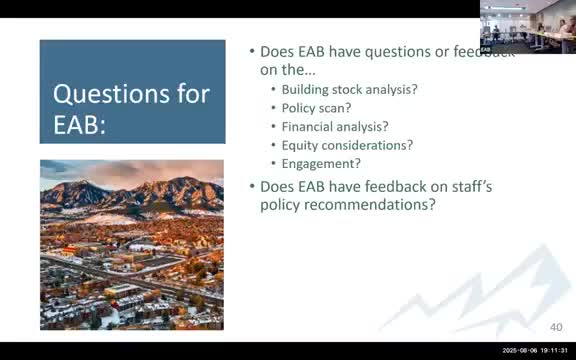Financial Analysis Highlights Costs and Savings from Building Electrification Efforts
August 08, 2025 | Boulder, Boulder County, Colorado
Thanks to Scribe from Workplace AI , all articles about Colorado are free for you to enjoy throughout 2025!

This article was created by AI using a video recording of the meeting. It summarizes the key points discussed, but for full details and context, please refer to the video of the full meeting. Link to Full Meeting
The discussion centered on the financial return on investment for residents and commercial property owners who may face new electrification requirements. Board members emphasized the importance of providing clear examples of costs and savings, particularly for retrofitting existing buildings. They noted that while electrification can lead to long-term savings, the initial investment may be daunting for many.
One board member pointed out that transitioning residential homes is generally easier, as standard appliances can be replaced with electric alternatives. However, the upfront costs can still be significant, especially when factoring in necessary electrical upgrades. The discussion acknowledged that while rebates could help offset some costs, predicting exact savings remains challenging due to fluctuating electricity and natural gas prices.
For commercial buildings, the conversation revealed a more complex landscape. Retrofitting these structures may not yield immediate financial benefits, and property owners could face substantial costs. The board recognized that while the transition is essential for environmental progress, it may not always be financially advantageous in the short term.
As Boulder City moves forward with its electrification goals, officials are tasked with ensuring that property owners are well-informed about the financial aspects of these changes. The board's discussions underscore the need for a balanced approach that considers both environmental benefits and economic realities, paving the way for a sustainable future in the community.
Converted from 8-6-25 Environmental Advisory Board Meeting meeting on August 08, 2025
Link to Full Meeting
Comments
View full meeting
This article is based on a recent meeting—watch the full video and explore the complete transcript for deeper insights into the discussion.
View full meeting
